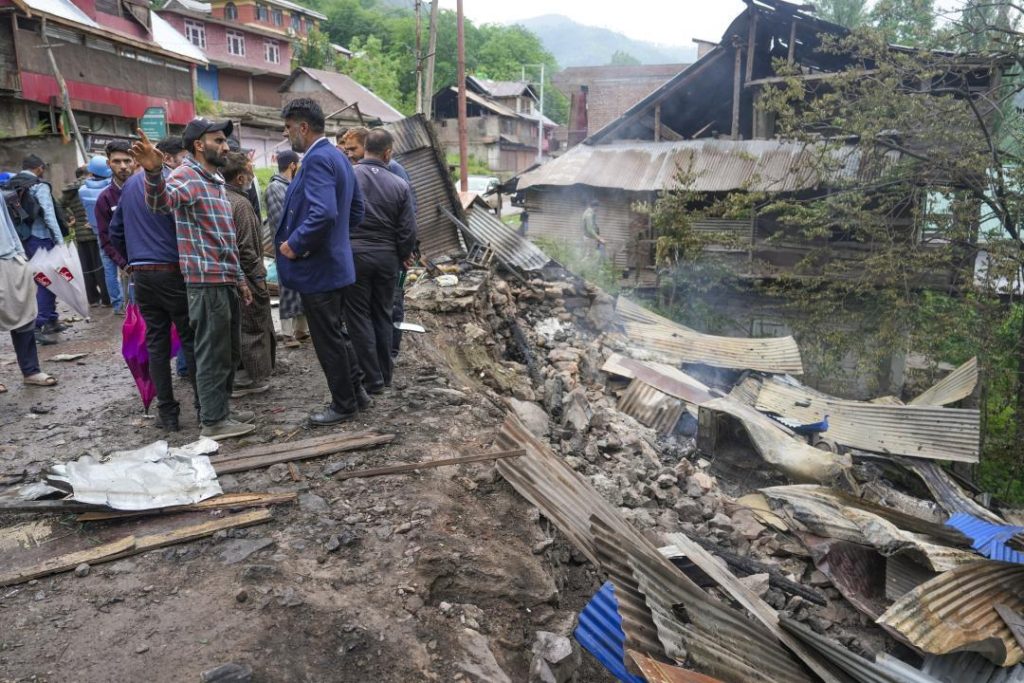
Sat to eat when sirens went off due to Pak shelling: J&K resident
The Uri sector in Jammu and Kashmir’s Baramulla district witnessed a terrifying night on Thursday, as Pakistan began shelling the area, leaving one woman dead and several others injured. The residents of Uri, who had just begun their dinner, were suddenly jolted out of their routine when the siren rang out, signaling the start of the intense shelling.
Babar, a 38-year-old resident of Uri, was one of the many who had to abandon their dinner plans to take shelter from the shelling. “We just sat down to eat when the siren rang out,” he said. “We left everything and ran to the neighbors’ bunker.” Babar’s experience is a stark reminder of the constant threat of violence that hangs over the residents of Uri, who have had to endure repeated shelling incidents in the past.
Babar’s house was destroyed twice in the past, once during the shelling in 1999 and again during an earthquake that struck the region. The trauma of those incidents is still fresh in his mind, and the latest shelling incident has left him shaken. “I thought I had seen the worst, but this incident has left me feeling helpless,” he said.
The shelling incident in Uri is the latest in a series of attacks that have targeted the region in recent months. Pakistan has been accused of carrying out several attacks along the Line of Control (LoC), which has resulted in the death and injury of several Indian soldiers and civilians.
The Uri sector is particularly vulnerable to shelling, as it is located close to the LoC. The region has a high concentration of military bases and installations, making it a prime target for Pakistani forces. The Indian Army has been responding strongly to these attacks, and the latest incident is no exception.
The shelling incident in Uri began around 9 pm on Thursday, when Pakistan’s military launched a barrage of mortar shells and rockets towards the Indian positions. The Indian Army responded quickly, firing back at the Pakistani positions and neutralizing several of the shells. The shelling continued for several hours, causing widespread damage to residential areas and infrastructure.
The residents of Uri were forced to take shelter in bunkers and other safe areas, as the shelling continued unabated. Several houses were damaged, and power supply was disrupted in many areas. The local hospital was also affected, with several injured civilians and soldiers being treated for their wounds.
The exact number of casualties is still unclear, but officials have confirmed that one woman was killed and several others were injured in the shelling. The Indian Army has also reported that several of its soldiers were injured, although the exact number is not known.
The incident has sent shockwaves across the region, with residents of Uri and other nearby areas expressing outrage and frustration at the constant threat of violence. The Pakistan Army’s actions have been widely condemned, with many calling for a strong response from the Indian government.
The latest shelling incident in Uri is a stark reminder of the ongoing conflict between India and Pakistan, which has been ongoing for decades. The two countries have fought several wars, and the situation remains tense, with both sides accusing each other of aggression.
The residents of Uri, like Babar, are forced to live in the shadow of violence, never knowing when the next shelling incident will occur. Their lives are marked by fear and uncertainty, as they struggle to rebuild and recover from the constant attacks.
As the region continues to grapple with the aftermath of the shelling incident, the people of Uri are left to wonder when the violence will stop. Will the Indian government take a strong stance against Pakistan’s aggression, or will the situation continue to simmer, with the residents of Uri and other nearby areas living in the constant fear of violence?
Only time will tell, but one thing is certain: the people of Uri will not forget the horrors of the latest shelling incident, and will continue to demand a peaceful resolution to the conflict.






